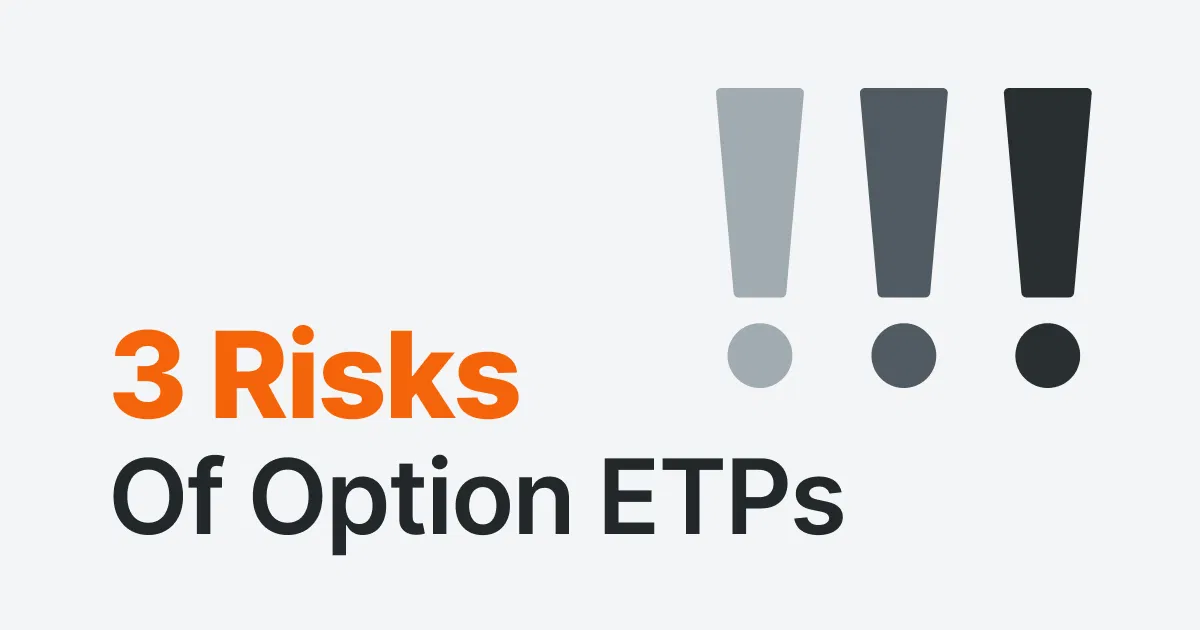
Author
Jonathan Hobbs, CFA
Date
12 Feb 2025
Category
Martket Insights
Three Risks of Income Options ETPs
Your capital is at risk if you invest. You could lose all your investment. Please see the full risk warning here.

Options-based ETPs (exchange-traded products) can offer steady income, but they also come with risks. Investors should understand how these strategies work – especially when it comes to managing downside risks. Here are three key risks to consider when investing in income-options ETPs.
Options ETP risk 1: NAV erosion
Most options-based ETPs generate income by selling options and distributing premiums to investors. But these regular payouts can gradually reduce the fund’s net asset value (NAV) over time.
If the ETP consistently pays out more in yield than it gains in asset value, NAV erosion can shrink long-term capital. And this can reduce the ETP’s ability to generate future income.
Example: A covered call ETP sells calls on its underlying stock to generate yield. If the stock price rises rapidly, the fund misses out on potential gains because it must sell at the strike price. Meanwhile, if the stock stagnates or drops, the NAV can erode over time as premiums paid out exceed NAV growth.
Read more: NAV Erosion Explained: Why It Matters in Options ETPs.
Options ETP risk 2: Yield vs. total return tradeoff
High yield doesn’t always mean high total return. Some income-focused options ETPs prioritize premium collection but may underperform in rising markets.
If the ETP distributes high yields but its NAV declines over time, investors could see lower total returns despite earning consistent income.
Example: A put-write ETP collects income by selling put options. But in a strong bull market, simply holding the underlying asset might generate better returns.
Options ETP risk 3: Market conditions and volatility risk
Options pricing is heavily tied to market volatility. While selling options can provide steady income, major market swings can impact returns.
High volatility: Option premiums may increase, but so do the risks. For example, covered call strategies may face early assignment if the stock trades well above the strike price before expiration. That means the ETP could be forced to sell the stock early at a set price – missing out on further gains. Over time, this can contribute to NAV erosion.
Low volatility: Premiums can shrink in less volatile markets. This can reduce the ETP’s income potential.
At IncomeShares, our options-based ETPs are actively managed to help navigate these risks while generating income through strategies like covered calls and put-writing.
Key takeaways
NAV erosion can impact long-term returns. Options-based ETPs that pay out high yields may see their NAV decline over time, reducing future income potential.
Yield isn’t the same as total return. High-yield strategies like covered calls and put-writing can generate income, but they may underperform in strong bull markets.
Market conditions affect options-based income strategies. Volatility plays a key role in premium collection – high volatility can increase income, while low volatility may reduce returns.
Your capital is at risk if you invest. You could lose all your investment. Please see the full risk warning here.
Related Products:
Strategy
Cash-Secured Put + Equity
Distribution Yield
25.10%
Strategy
Cash-Secured Put + Equity
Distribution Yield
20.76%
Strategy
Cash-Secured Put + Equity
Distribution Yield
29.60%
Strategy
Cash-Secured Put + Equity
Distribution Yield
65.40%
Strategy
Covered Call
Distribution Yield
10.80%
